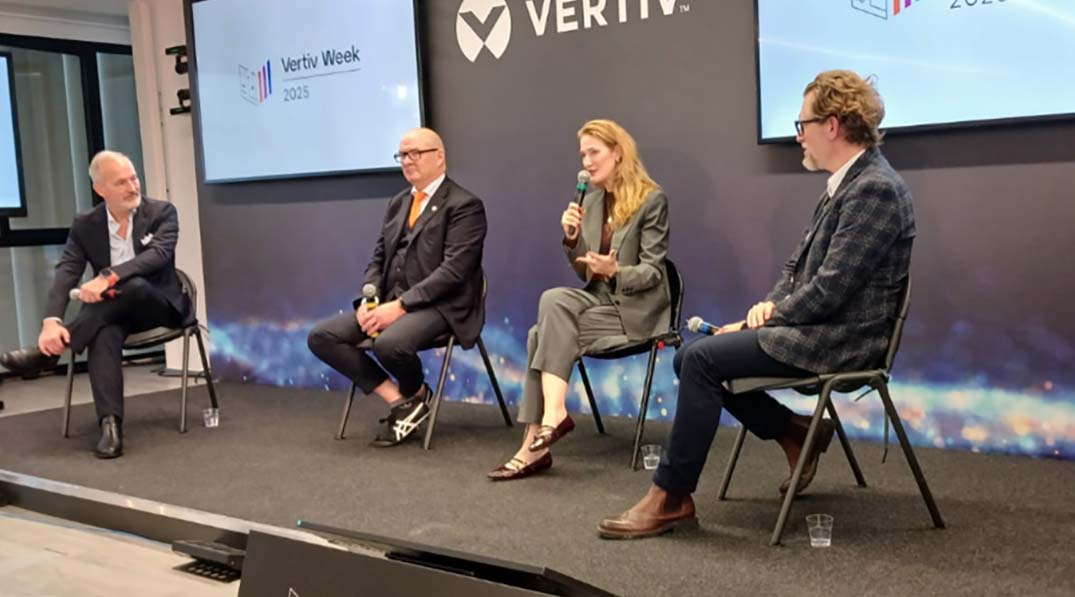Kathy Gibson reports from Tognana, Italy – Europe is standing as one in the development of a globally competitive data centre industry.
At a meeting of Data Centre Associations hosted by Vertiv, industry leaders came together to identify common issues and areas of collaboration.
Recognising that digitalisation touches every part of our lives is key. As Lex Coors, president and policy committee chairman of the European Data Centre Association, points out, data centres facilitate everything that users do – whether it is taking pictures, capturing voice, booking flights, or banking – a data centre processes the data that enables that.
At the same time, data centres are the engines of innovation, adds Luisa Cardani, head of data centres programme at TechUK.
Piotr Kowalski, MD of the Poland Data Centre Association, explains that, today, data centres are part of our critical infrastructure. “In the same way we need power and water, we need data centres running to keep societies operational.”
For Europe to compete on the global data centre stage, the individual countries need to collaborate and work together, the DCA delegates agree.
The starting point is to create a common language and standards to describe individual countries’ environments against the backdrop of Europe-wide legislation.
“We acknowledge that every country is talking about the same issues, but using different terminology,” says Coors. “So we aim to provide an overview, outlining the same issues for every country, in one language.”
The various countries can also learn from one another. “It is about being a collective, and acting as one unit,” Coors says.
“The sector has no boundaries,” adds Cardani. “Data moves freely around the world. So it’s Important to work together, to have one unified voice talking about the sector, and educating policy-makers and the public.”
For Kowalski, collaboration is more important, as it will allow those countries that couldn’t stand alone to compete on the world stage. “As individual countries we stand no chance in that race – but, as a continent, we do.”
And it’s important that the continent keeps its place in the digital world – which means a thriving data centre industry.
“Data centres support everything, whether a small shop or a multinational,” says Cardani. “Their presence in a country enables further competition – and a country with strong compute capabilities will flourish.”
She adds that history bears this out: during the Industrial Revolution, the UK did well because there was a plentitude of power in the form of coal, and innovation.
“The same can be said about the opportunities that data centres provide for everyone from pharmaceutical and banking to the small shop down the road.
“The digital world is global; having home capacity is a country’s strength and we want it to be a European strength.”
The benefits of collaboration can be seen in a so-called second tier data centre market like Poland which is quickly shortening the distance as a benefit of collaboration with its European neighbours.
“The support from more mature associations allows us to quickly develop and be recognised by policy-makers,” Kowalski says.
As it builds out data centres – it aims to triple capacity within the next three to five years – Europe expects to attract about 300-billion Euros in investments.
Data centres run on electricity, and plenty of it, so it’s vital the EU moves now to upgrade its power grid, Coors points out.
A combination of solar, wind, and nuclear energy is being employed as the economic bloc aims to close the gap with the leading AI data centre powers of the US and China.
“We have to build now or we will buy capacity forever,” Coors says.
But data centres are not just energy consumers, they can play a big role in the domestic heating cycle.
“Heat producers need to be decarbonised at the same time we are building data centres producing waste heat at scale,” says Coors.
“The heat waste from data centres is low temperature, but it can support 20% of the heat providers’ needs. So even if we give it away, we are helping to decarbonise heat networks.”
Heat waste can also be used in agriculture, heating greenhouses, or reversed to control excessively high temperatures.
“Data centres were the drivers of clean, renewable power,” Cardani points out. “And now we can provide heat for domestic use as well.”

